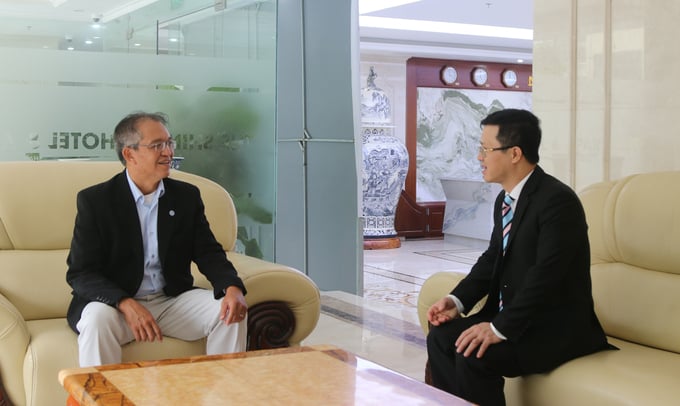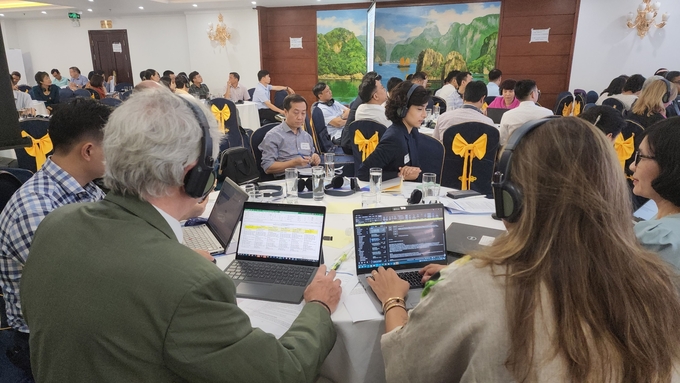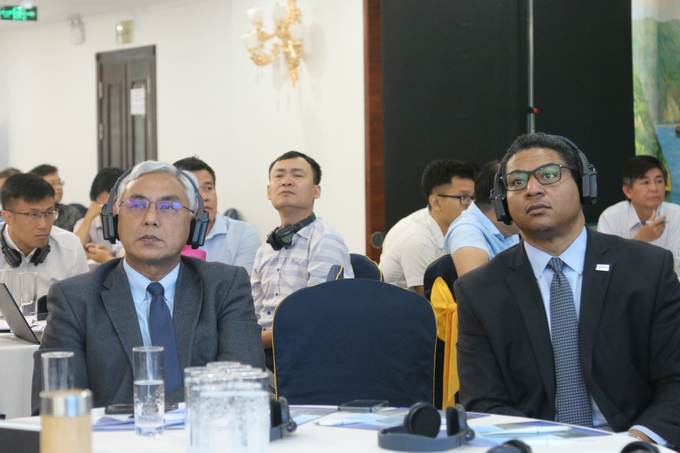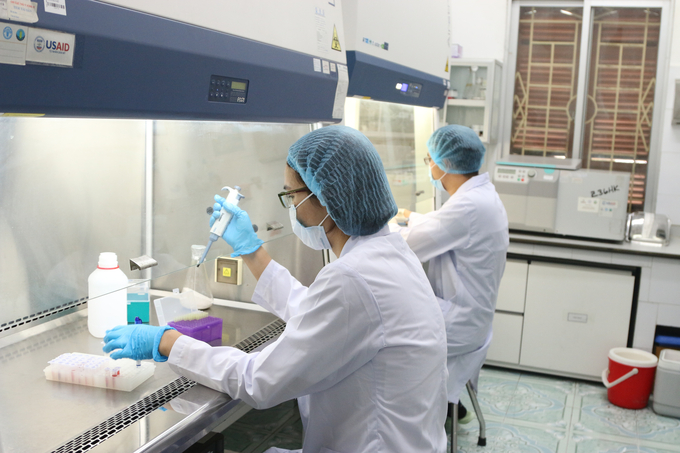June 7, 2025 | 20:35 GMT +7
June 7, 2025 | 20:35 GMT +7
Hotline: 0913.378.918
June 7, 2025 | 20:35 GMT +7
Hotline: 0913.378.918

Mr. Nguyen Van Long (right), Director of the Department of Animal Health (MARD) discussed with Doctor and veterinarian Pawin Padungtod on the sidelines of the conference. Photo: Dinh Muoi.
In 3 days, from August 16 to 18, in Hai Phong City, the Ministry of Agriculture and Rural Development, the Ministry of Health, and the Ministry of Natural Resources and Environment co-chaired the organization of the National Workshop on capacity connection for the implementation of the International Health Regulations and veterinary capacity.
Attending the workshop were units specialized in monitoring and emergency response to infectious diseases of 3 ministries and related units within the interdisciplinary health-veterinary-environment framework. International organizations are UNEP, USCDC, USAID, International Livestock Research Institute, World Bank, GIZ, WCS, PATH, WWF, IUCN, UNDP, ECTAD,...
Recently, issues related to zoonotic diseases, and antibiotic resistance are topics of concern to the whole world due to their close relation to human health. This is also an issue of special concern to agencies of the health, veterinary and environmental sectors in Vietnam.
Currently, the World Health Organization and the World Organization for Animal Health both have international regulations relating to the health and capacity of animal health activities.

Delegates attending the Conference. Photo: Dinh Muoi.
According to Mr Nguyen Van Long, Director of the Department of Veterinary Medicine, the purpose of the workshop is to help Vietnamese agencies understand and properly understand to apply effectively regulations of the World Health Organization and the World Organization for Animal Health related to health, especially in the prevention and control of animal diseases, diseases transmitted from animals to humans and problems of drug resistance.
The workshop will help Vietnamese agencies understand the current situation, especially in the coordination between the three sectors of health, veterinary medicine and environment to implement work contents. In the coming time, according to international regulations, Vietnam needs to adjust and supplement regulations and coordinate regulations to be able to manage One Health and control animal diseases, and drug resistance well, and effectively enforce the provisions of Vietnamese and international laws.
In addition, world organizations will introduce to Vietnam an approach to self-assessment in the context of increasing epidemic hazards, drug resistance and complicated developments. International organizations and experts will also introduce the responsible agencies of Vietnam to the set of guiding tools so that we can best implement the situation assessment.
“This is an extremely important international conference, held for the first time in Vietnam, with the participation of leading international health organizations as well as ministries and sectors such as: Agriculture and Rural Development, Health, Natural Resources and Environment to help us have an overview and understand the regulations. From there, we have solutions to report to the competent authorities and organize the implementation and direction in the near future from the central to the roots level”, Mr Nguyen Van Long emphasized.

Representatives of international organizations listen to reports from Vietnamese units. Photo: Dinh Muoi.
According to Mr. Nguyen Van Long, at this conference, international organizations will introduce 7 steps to manage diseases well. The goal is for the purposes of human health, animal health and sustainable environmental health.
Specifically, this includes jointly identifying problems, preparing the legal basis, and preparing action programs and related materials so that we are ready to carry out the work. Work together for best implementation from veterinary, health and environmental perspectives. Reviewing the implementation of the whole process, both advantages and disadvantages. Finally, coordinate across disciplines to reach the goal of One Health.
Performing the assigned functions and tasks, the veterinary, health, and environmental sectors,... consult the Party and Government to have clear instructions. Resolution No. 19 of the Party Central Committee pointed out the tasks of the Veterinary sector to do.
After the Resolution of the Central Committee, the Politburo, the Secretariat, the National Assembly, the Government, and the Prime Minister also concretized instructions related to this important content.
In addition, the Ministry of Agriculture and Rural Development has submitted to the Prime Minister for approval of 7 national programs and plans, especially the project on strengthening the capacity of the Veterinary sector at all levels, plan to implement priority activities of the veterinary sector to achieve One Health, control disease and drug resistance.
From that full legal basis, the action programs are concretized by the Ministry of Agriculture and Rural Development by guiding and organizing effective implementation into practice. Specialized agencies from the central to local levels have been invested and strengthened in capacity to be ready to respond to all threats from epidemics and drug resistance. Vietnam also cooperates very closely with international organizations to provide professional, technical, expert and financial support for the implementation of international and Vietnamese regulations in this field.
“In matters relating to One Health, we are doing well. In the coming time, with the support of international organizations, clear regulations and the attention of the Party and State's leadership and direction, especially the coordination between the three ministries: Health, Agriculture and Rural Development, and Natural Resources and Environment. The involvement of local authorities will help us achieve the goals of disease control, control of drug resistance for human health, animal health and sustainable environmental health”, Mr Nguyen Van Long affirmed.

The capacity of the veterinary industry in Vietnam has improved in recent years. Photo: Dinh Muoi.
On the sidelines of the seminar, Dr., Veterinarian Pawin Padungtod - Senior Technical Coordinator in the Center for Emergency Control of Transboundary Animal Diseases (ECTAD) says that over the past 20 years, the capacity of the veterinary sector has improved.
In the early years of the 21st century, veterinary medicine made an effective contribution to the prevention of human diseases. The most obvious proof is during the Covid-19 pandemic, ... many laboratories under the Department of Animal Health have been established and have the capacity to diagnose, test and issue certificates to people...
Also according to Doctor, Veterinarian Pawin Padungtod, the results achieved and the contents discussed at the conference will help organizations to recognize and develop an interdisciplinary action plan between veterinary, health and environmental resources. This will also be the basis for international organizations to mobilize budget sources to support the Government of Vietnam in disease prevention.
"Previously, we had two tools to assess capacity: IHR and PVS. In which, IHR is a tool to assess the capacity of the health sector and PVS is a tool to assess the capacity of the veterinary industry. These two tools were previously conducted independently. However, at this workshop, the capacity of the two sectors will be assessed together, and the overlapping issues between the two sectors will be compared and re-evaluated. From there, we know what more investment is needed to mobilize funding", said Dr., Veterinarian Pawin Padungtod.
Translated by Hoang Duy

(VAN) VAAS and numerous Vietnamese enterprises have signed cooperation agreements with Japanese partners to promote agricultural technology and trade connectivity.
/2025/05/29/5625-12-214801_567.jpg)
(VAN) Provincial mergers in the Mekong Delta promise to streamline administration, expand inter-provincial raw material areas, and foster close linkages in agricultural value chains, benefiting both businesses and cooperatives.

(VAN) Merging Mekong Delta provinces contributes to the expansion of agricultural raw material areas, addressing previous constraints caused by provincial boundaries. Additionally, this expansion will reduce costs and strengthen linkages between businesses, cooperatives, and farmers.
/2025/05/29/1043-2-153730_145.jpg)
(VAN) The Government's policy to merge provincial-level administrative units opens up major opportunities for the Mekong Delta region to reshape its agricultural development strategy toward large-scale production, effective regional linkages, and sustainability.

(VAN) The mutual export of agrifood products between the European Union (EU) and the United Kingdom (UK) must occur again without certification, border controls or other red tape. This was agreed at the UK-EU summit.
/2025/05/22/5121-2-173645_677.jpg)
(VAN) NBSAP Tracker identifies strengths and areas for improvement in the National Biodiversity Strategy, based on each region’s priorities and capacities.

(VAN) The draft amendment to the Circular on rice export trading stipulates a periodic reporting regime for rice exporting enterprises.